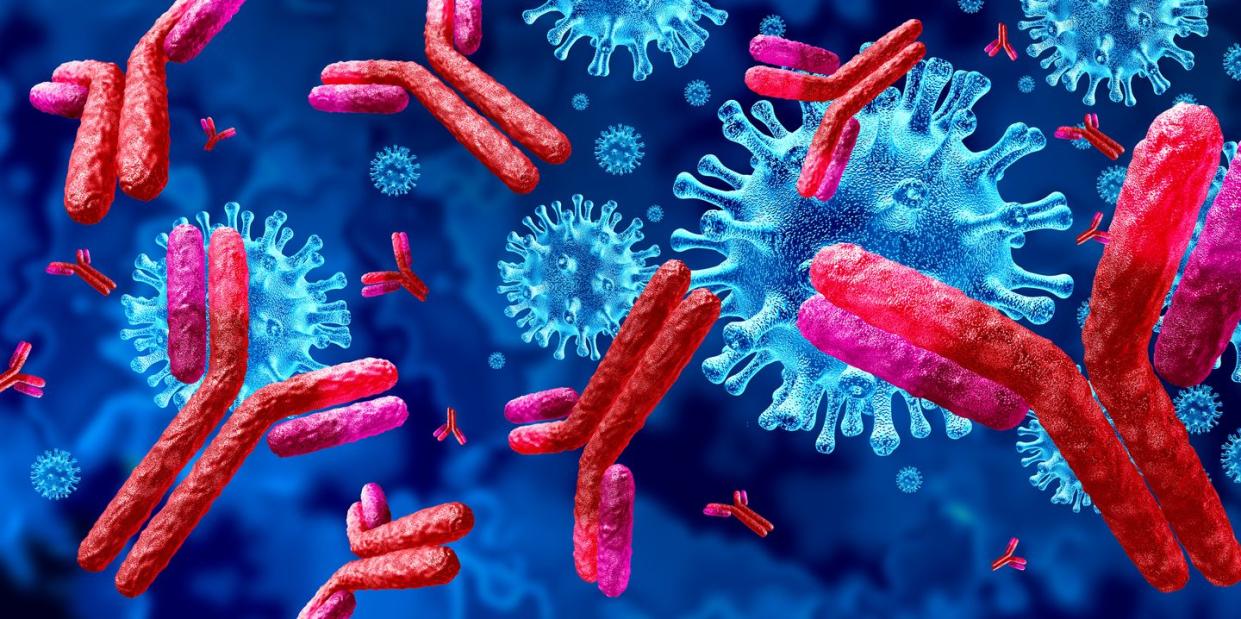Doctors Explain Why You Should Still Get Vaccinated if You Already Had COVID-19

About a year after the coronavirus pandemic hit the U.S., three highly effective COVID-19 vaccines have been authorized for use—a remarkable feat that will be the nation’s best chance at developing widespread immunity.
The U.S. has slowly increased its supply of the Pfizer-BioNTech, Moderna, and Johnson & Johnson vaccines—but rollout looks different from state to state.
Highly populated areas, like New York City, still have stricter eligibility requirements, while nearly half of states plan to open eligibility to all residents 16 and older by the end of April 2021, per a recent CNN analysis.
President Joe Biden has ordered all states to make vaccinations available to all adults by no later than May 1, making it very likely that you’ll have the chance to line up for your dose in the near future.
But if you’ve already had COVID-19 and successfully recovered from it, you’re probably wondering what this means for you. Should you get the vaccine or are you already protected? Ahead, doctors explain what to know.
Should you get vaccinated if you already had COVID-19?
Yes, you should be fully vaccinated whether you’ve had COVID-19 or not, according to the Centers for Disease Control and Prevention (CDC).
There is a caveat, though. If you were treated for COVID-19 with monoclonal antibodies or convalescent plasma, the CDC says you should wait 90 days before getting a COVID-19 vaccine. The reason: The treatments may lead to a “less robust” immune response from your body, says Richard Watkins, M.D., an infectious disease physician and professor of internal medicine at the Northeast Ohio Medical University. (If you’re not sure what treatments you received for COVID-19, talk to your doctor.)
Why should you get vaccinated against COVID-19 if you were already infected with the virus?
Public health experts are still learning about COVID-19 immunity, including how protective it is after a natural infection—and how long that protection actually lasts once you have antibodies, says Iahn Gonsenhauser, M.D., chief quality and patient safety officer at The Ohio State University Wexner Medical Center.
Remember: Antibodies are proteins made by your immune system to fight infections. So, if you had COVID-19 back in April, it’s unclear if those antibodies, as well as other important infection fighters like T-cells, would still be at detectable levels in your system now or be robust enough to fight off a new, highly infectious coronavirus variant, like B.1.1.7 (the U.K. variant) or P.1 (the Brazil variant).
There have also been confirmed reports of people getting re-infected after recovering from an initial bout of COVID-19, so getting vaccinated will help to ensure that you will, in fact, have strong immunity against the virus—including circulating variants—in the future, Dr. Gosenhauser says.
How? Getting fully vaccinated “helps to boost your immune response if you are exposed to COVID-19 again,” Dr. Watkins says. The immunity provided by the authorized vaccines is “strong,” he says, adding, that if you had COVID-19, the antibodies produced from that infection may not last over time.
Is it safe to get the vaccine if you’ve already had COVID-19? Will you have vaccine side effects?
It’s absolutely safe. The CDC officially recommends that you still get the vaccine if you’ve already had COVID-19, as it will simply help “boost” your immunity or ensure that you have complete immunity, says William Schaffner, M.D., an infectious disease specialist and professor at the Vanderbilt University School of Medicine.
Like any other person who receives the vaccine, it’s possible to experience side effects after getting your dose. “There’s no reason to think that the side effects or safety profile would be any different,” says Dr. Gonsenhauser. This mainly includes pain, soreness, or swelling at the injection site, a potential fever or chills, and other flu-like symptoms, like a headache, fatigue, and muscle pain.
Also important to remember: It’s totally possible you may have no side effects at all. If you do, they should pass within a few days.
Will the vaccine protect you even more if you’ve already had COVID-19?
OK, so if the vaccine can help ensure your immunity after having COVID-19 and you likely have some immunity already, is it possible that you’ll have even better results fighting off the coronavirus than someone who has never been infected?
That’s a question medical experts are still exploring. In short: We just don’t know yet, Dr. Watkins says.
Bottom line: Whether you’ve had COVID-19 or not, experts stress the importance of getting vaccinated to ensure you stay protected. (Worth noting, both Pfizer and Moderna are testing a potential booster shot of their respective vaccines to stay ahead of the variants.)
The pandemic isn’t over just yet, so it’s important to keep up with safety precautions. Wear a mask in public, keep your distance from people outside of your household, avoid unnecessary travel, and get vaccinated when you have the opportunity to do so. “It’s worth it,” Dr. Schaffner says.
This article is accurate as of press time. However, as the COVID-19 pandemic rapidly evolves and the scientific community’s understanding of the novel coronavirus develops, some of the information may have changed since it was last updated. While we aim to keep all of our stories up to date, please visit online resources provided by the CDC, WHO, and your local public health department to stay informed on the latest news. Always talk to your doctor for professional medical advice.
Go here to join Prevention Premium (our best value, all-access plan), subscribe to the magazine, or get digital-only access.
You Might Also Like

